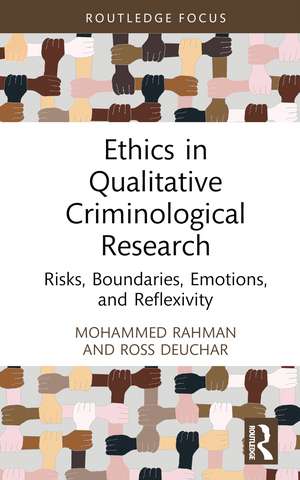Ethics in Qualitative Criminological Research: Risks, Boundaries, Emotions, and Reflexivity
Autor Mohammed Rahman, Ross Deucharen Limba Engleză Hardback – 17 iul 2024
By engaging with this book, readers will be exposed to critical themes of managing risks, including physical harm and psychological trauma, navigating boundaries, dealing with the intense emotions that surface during research, and the importance of reflexivity in qualitative criminological research. The themes are illustrated through real-life examples that the authors have encountered during their fieldwork, using reflexive practices to highlight how they were able to ethically deal with unforeseen challenges. By presenting solutions, asking critical questions, and offering practical recommendations, the book guides readers on mitigating ethical issues, and provides a comprehensive approach to conducting research responsibly and ethically.
Ethics in Qualitative Criminological Research will be useful for undergraduate and postgraduate students, academic researchers and practitioners with an interest in conducting research, and pracademics occupying both practitioner and academic roles.
Preț: 388.71 lei
Preț vechi: 422.51 lei
-8% Nou
Puncte Express: 583
Preț estimativ în valută:
74.40€ • 80.85$ • 62.54£
74.40€ • 80.85$ • 62.54£
Carte disponibilă
Livrare economică 31 martie-14 aprilie
Livrare express 14-20 martie pentru 24.29 lei
Preluare comenzi: 021 569.72.76
Specificații
ISBN-13: 9781032299297
ISBN-10: 1032299290
Pagini: 104
Ilustrații: 2
Dimensiuni: 138 x 216 x 13 mm
Greutate: 0.27 kg
Ediția:1
Editura: Taylor & Francis
Colecția Routledge
Locul publicării:Oxford, United Kingdom
ISBN-10: 1032299290
Pagini: 104
Ilustrații: 2
Dimensiuni: 138 x 216 x 13 mm
Greutate: 0.27 kg
Ediția:1
Editura: Taylor & Francis
Colecția Routledge
Locul publicării:Oxford, United Kingdom
Public țintă
Postgraduate and Undergraduate AdvancedRecenzii
“Considering pertinent issues associated with qualitative criminological research in contemporary settings, Rahman and Deuchar draw upon their own experience of working with hard-to-reach and marginalised populations to raise difficult, yet must have conversations, concerning an ever-evolving field of ethics. In doing so, the authors offer both practical recommendations and direction for the future of ethics. The work is most certainly a must read for anyone seeking to undertake cutting edge criminological research.”
Dr Robert McLean, University of the West of Scotland
“Ethics in Criminological Research: Risks, Boundaries, Emotions, and Reflexivity offers unique and invaluable insights into navigating the ethical complexities of qualitative research in criminology – of which there are many. Drawing from rich literature and personal experiences, Rahman and Deuchar provide practical solutions to ethical dilemmas, making it an essential guide for students, researchers, and practitioners alike.”
Associate Professor Amin Asfari, Regis University
“Research ethics are probably the most important but most neglected topic in methods training. As such it is fantastic to see research ethics front and centre in this engaging new text by two experienced researchers.”
Professor Shadd Maruna, University of Liverpool
“Ethics in Criminological Research: Risks, Boundaries, Emotions, and Reflexivity is an insightful work of many qualities. Rahman and Deuchar have ‘walked the walk’ before writing such as book and the end product is a rounded and admirably clear account of the often unclear boundaries in the complex landscape of criminological research. This is an essential read especially for early career criminologists and other social scientists, who will also find wise, practical, and ethical solutions.”
Professor Georgios A. Antonopoulos, Northumbria University
Dr Robert McLean, University of the West of Scotland
“Ethics in Criminological Research: Risks, Boundaries, Emotions, and Reflexivity offers unique and invaluable insights into navigating the ethical complexities of qualitative research in criminology – of which there are many. Drawing from rich literature and personal experiences, Rahman and Deuchar provide practical solutions to ethical dilemmas, making it an essential guide for students, researchers, and practitioners alike.”
Associate Professor Amin Asfari, Regis University
“Research ethics are probably the most important but most neglected topic in methods training. As such it is fantastic to see research ethics front and centre in this engaging new text by two experienced researchers.”
Professor Shadd Maruna, University of Liverpool
“Ethics in Criminological Research: Risks, Boundaries, Emotions, and Reflexivity is an insightful work of many qualities. Rahman and Deuchar have ‘walked the walk’ before writing such as book and the end product is a rounded and admirably clear account of the often unclear boundaries in the complex landscape of criminological research. This is an essential read especially for early career criminologists and other social scientists, who will also find wise, practical, and ethical solutions.”
Professor Georgios A. Antonopoulos, Northumbria University
Cuprins
1 Philosophy, Ethics, Research Governance, and Reflexivity
2 Dealing with Risks: Applying for Ethical Approval and Changes after Ethical Approval
3 Dealing with Boundaries: Negotiating Boundaries, Disclosure, and Ethical Covertness
4 Dealing with Research Emotions: Emotional Engagement, Exposure, and Reflexivity
5 Research Publication, the Future of Research Ethics, and Practical Recommendations
2 Dealing with Risks: Applying for Ethical Approval and Changes after Ethical Approval
3 Dealing with Boundaries: Negotiating Boundaries, Disclosure, and Ethical Covertness
4 Dealing with Research Emotions: Emotional Engagement, Exposure, and Reflexivity
5 Research Publication, the Future of Research Ethics, and Practical Recommendations
Notă biografică
Mohammed Rahman is Senior Lecturer in the College of Law, Social and Criminal Justice at Birmingham City University, UK. He is also a Network Expert for the Global Initiative Against Transnational Organized Crime.
Ross Deuchar is Professor of Criminology and Criminal Justice in the School of Education and Social Sciences at the University of the West of Scotland, UK.
Ross Deuchar is Professor of Criminology and Criminal Justice in the School of Education and Social Sciences at the University of the West of Scotland, UK.
Descriere
Providing academic insights, reflections, and practical guidance on ethically conducting qualitative criminological research, this book emphasizes real-life examples to navigate research risks, boundaries, and emotions while spotlighting reflexivity as a pivotal tool for qualitative inquiries.
